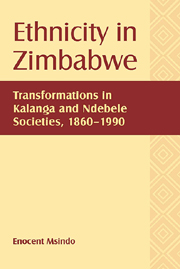Book contents
- Frontmatter
- Contents
- List of Illustrations
- Acknowledgments
- List of Abbreviations
- Note to the Reader
- Introduction
- 1 Ethnicity and Identities in Matabeleland
- 2 Domination and Resistance: Precolonial Ndebele and Kalanga Relations, 1860–93
- 3 Remaking Communities on the Margins: Chieftaincy and Ethnicity in Bulilima-Mangwe, 1893 to the 1950s
- 4 Ultraroyalism, King's Cattle, and Postconquest Politics among the Ndebele, 1893 to the 1940s
- 5 Language and Ethnicity in Matabeleland
- 6 Contests and Identities in Town: Bulawayo before 1960
- 7 Complementary or Competing? Ethnicity and Nationalism in Matabeleland, 1950–79
- 8 Postcolonial Terror: Politics, Violence, and Identity, 1980–90
- Conclusion
- Notes
- Selected Bibliography
- Index
- Rochester Studies in African History and the Diaspora
Conclusion
Published online by Cambridge University Press: 05 February 2013
- Frontmatter
- Contents
- List of Illustrations
- Acknowledgments
- List of Abbreviations
- Note to the Reader
- Introduction
- 1 Ethnicity and Identities in Matabeleland
- 2 Domination and Resistance: Precolonial Ndebele and Kalanga Relations, 1860–93
- 3 Remaking Communities on the Margins: Chieftaincy and Ethnicity in Bulilima-Mangwe, 1893 to the 1950s
- 4 Ultraroyalism, King's Cattle, and Postconquest Politics among the Ndebele, 1893 to the 1940s
- 5 Language and Ethnicity in Matabeleland
- 6 Contests and Identities in Town: Bulawayo before 1960
- 7 Complementary or Competing? Ethnicity and Nationalism in Matabeleland, 1950–79
- 8 Postcolonial Terror: Politics, Violence, and Identity, 1980–90
- Conclusion
- Notes
- Selected Bibliography
- Index
- Rochester Studies in African History and the Diaspora
Summary
This book has examined how identities were shaped by social and political processes in both rural and urban Matabeleland, particularly among the Kalanga and the Ndebele since the precolonial era. Precolonial inequalities of power in the Ndebele state triggered important debates and social changes not only among people within the Ndebele state but also among those Kalanga who had, for fear of hegemonic Ndebele sociopolitical influence, relocated to its margins. These processes—that is, Ndebele inequalities as felt internally within the Ndebele state and the withdrawal of Kalanga to the margins, which move gave them the chance to reorganize their communities —led to the emergence of Ndebele and Kalanga ethnicity, whose development differed as a result of events within their individual societies. Ndebele and Kalanga ethnicities continued to be fashioned much more during the colonial era, as a result of responses to colonial policy, direct colonial influence, and debates that were predominantly internal to the African societies. Africans in general struggled to redefine themselves in town, define their urban cultures, and claim land for their own use. Ndebele and Kalanga in particular tried to deal with remnants of the Ndebele aristocracy, which still imagined a very strong royalist outlook as the basis for Ndebele identity, and with questions of language, identity, and belonging in both rural and urban contexts as they also attempted to re-create communities and social order in new reserves, African purchase areas, and other spheres.
- Type
- Chapter
- Information
- Ethnicity in ZimbabweTransformations in Kalanga and Ndebele Societies, 1860-1990, pp. 229 - 234Publisher: Boydell & BrewerPrint publication year: 2012

